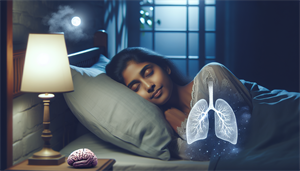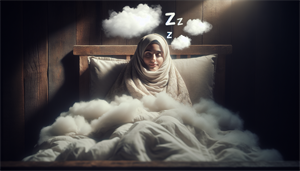Exploring the Impact: How Caffeine and Sleep Apnea Interact
Caffeine, the world’s most widely consumed psychoactive substance, is often used to combat daytime sleepiness. But what about when that sleepiness is the result of a sleep disorder, such as obstructive sleep apnea? The interaction between caffeine and sleep apnea is a complex one, with caffeine potentially exacerbating sleep quality and sleep apnea symptoms, while also providing temporary relief from daytime sleepiness. Let’s dive into this intricate relationship and explore the impact of this often-relied-on stimulant on sleep health.
Key Takeaways
-
Caffeine consumption can exacerbate sleep apnea and worsen its effects, impacting sleep latency, REM sleep quality, and potential disruptions.
-
Strategies to manage caffeine intake include limiting it and choosing lower-caffeine options such as tea or coffee varietals like Laurina & Aramosa.
-
Alternatives to caffeine for daytime alertness include exercise, adequate rest & hydration, avoiding screens before bedtime, aromatherapy. Yoga/stretching routines.
Understanding Sleep Apnea and Caffeine Dynamics

Sleep apnea, a condition characterized by repeated interruptions in breathing during sleep, is often accompanied by excessive daytime sleepiness. This can lead patients to turn to caffeine for a quick energy boost. However, this can trigger a detrimental cycle, as caffeine intake can result in insomnia, thereby exacerbating daytime sleepiness and potentially worsening other effects such as impaired memory and cardiovascular disease.
Furthermore, caffeine is recognized for its potential to exacerbate severe sleep disordered breathing, a symptom of sleep apnea, consequently impacting overall sleep quality. Hence, individuals heavily relying on caffeine might want to think about getting tested for sleep apnea. Addressing the disorder could significantly enhance sleep quality and daytime alertness.
The Truth Behind Caffeine's Effect on Sleep Quality
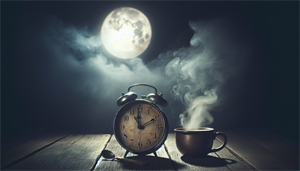
Caffeine has a notorious reputation for interfering with sleep. From extending the time it takes to fall asleep to reducing the overall duration and efficiency of sleep, caffeine certainly leaves its mark on our sleep patterns. However, the influence of caffeine extends beyond just making it harder to fall asleep.
In order to grasp the influence of caffeine on sleep quality, we need to examine its implications on sleep latency, REM sleep, and sleep disruptions that could be caused by various caffeinated beverages.
Sleep Latency and Caffeine
Sleep latency refers to the time it takes for an individual to transition from full wakefulness to sleep. It serves as a marker for evaluating sleep efficiency, with a sleep latency of 10 to 20 minutes considered optimal for achieving a sound and rejuvenating night’s rest. Caffeine, however, can notably extend this duration, particularly in individuals dealing with sleep apnea, posing a significant concern.
High caffeine intake can exacerbate sleep deprivation and daytime sleepiness in sleep apnea patients, leading to an increased reliance on caffeine and a cycle of impaired sleep. Furthermore, specific types of caffeinated beverages may affect symptoms of obstructive sleep apnea more than others, emphasizing the importance of choosing your caffeine sources wisely.
REM Sleep and Caffeine Intake
Rapid Eye Movement (REM) sleep, a sleep stage distinguished by rapid eye movements and heightened brain activity, is crucial for restful sleep as it contributes significantly to memory consolidation, learning, and emotional regulation. Yet, the consumption of caffeine can disrupt the normal sleep cycle by delaying and extending REM sleep, disrupting sleep quality, and decreasing sleep depth. These disruptions can hinder the restorative nature of sleep, worsening sleep deprivation, and diminishing cognitive function the following day.
Such disruptions can be particularly alarming for people with sleep apnea. Increased instances of apnea during REM sleep could further disrupt this restorative phase, affecting overall sleep quality along with cognitive and emotional health.
Sleep Disruption from Caffeinated Beverages
Not all caffeinated beverages are created equal when it comes to their potential for sleep disruption. Specific caffeinated beverages, such as caffeinated soda, may have a more pronounced impact on sleep disruption compared to others, such as tea or coffee. This could be due to factors such as the high sugar content and lack of essential nutrients in some sodas.
Studies suggest that acute caffeine consumption can delay the initiation of sleep and reduce its depth, particularly when taken in the evening. This underlines the need for not just selecting your caffeine sources carefully, but also considering when you consume it.
Caffeine Consumption: A Double-Edged Sword for Sleep Apnea Patients
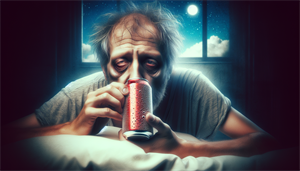
For individuals with sleep apnea, caffeine consumption can indeed be a double-edged sword. On one hand, caffeine can enhance wakefulness and decrease drowsiness, thus assisting in improving daytime alertness. On the other hand, the consumption of caffeine can have a detrimental effect on sleep apnea symptoms, potentially initiating a cycle of dependency where the heightened daytime sleepiness leads to a greater reliance on caffeine, thus worsening sleep apnea symptoms and overall sleep quality.
Moreover, the increased consumption of caffeine during the day can elevate blood pressure, potentially contributing to the development or worsening of sleep apnea. This, in turn, may result in heightened daytime drowsiness, leading to a greater dependency on caffeine to alleviate the sleepiness, thus establishing a detrimental cycle.
Decoding the Relationship Between Blood Pressure and Sleep Apnea
High blood pressure, a common health concern globally, can potentially contribute to the development or worsening of sleep apnea. In addition, excessive caffeine consumption can elevate the probability of developing high blood pressure, thus contributing to its occurrence.
Sleep apnea, in turn, can elevate both nighttime and daytime blood pressure levels, as airway obstructions can result in an elevation of blood pressure. This correlation is probably attributable to sustained, heightened sympathetic activation linked to intermittent hypoxia, resulting in prolonged elevation of blood pressure.
Strategies to Manage Caffeine Intake for Better Sleep Health
Reducing caffeine intake and making thoughtful choices about the type and timing of caffeine consumption can be a significant step toward better sleep health for individuals with sleep apnea. We should look into some techniques for reducing caffeine dependence, selecting caffeinated beverages thoughtfully, and consulting a sleep specialist for advice.
Breaking Free from Caffeine Reliance
Decreasing caffeine intake can yield numerous health advantages, such as enhanced sleep quality, decreased daytime drowsiness, and improved management of sleep apnea symptoms. However, making this change can lead to caffeine withdrawal symptoms, which can include headaches, fatigue, and mood swings. To manage these symptoms, individuals can ensure they are getting an adequate amount of sleep, gradually decrease their caffeine intake, maintain proper hydration, and explore caffeine-free alternatives.
In addition to reducing caffeine intake, there are several caffeine-free alternatives that can enhance alertness without disrupting sleep quality. These include:
-
Engaging in physical exercise
-
Ensuring adequate hydration
-
Consuming a well-rounded diet
-
Taking regular breaks for stretching
-
Obtaining sufficient sleep
Choosing Your Caffeinated Drinks Wisely
The amount of caffeine in different types of caffeinated beverages can vary widely. For instance:
-
An 8 oz cup of brewed coffee contains approximately 80-100 mg of caffeine
-
The same amount of cola contains 8-15 mg of caffeine
-
Brewed tea contains around 20-60 mg of caffeine
Therefore, switching from a high-caffeine beverage like coffee to a lower-caffeine option like tea can help reduce total caffeine intake without completely eliminating it.
Certain coffee varietals like Laurina and Aramosa are recognized for having lower caffeine levels. Likewise, some teas, such as Japanese roasted barley tea (Mugicha), are known as a coffee alternative with low caffeine content. Therefore, opting for these less disruptive options can help mitigate the adverse effects of caffeine on sleep quality.
Consulting a Sleep Specialist
Seeking the expertise of a sleep specialist for the management of sleep apnea and caffeine consumption can yield numerous advantages. These include:
-
Receiving an accurate diagnosis
-
Obtaining a personalized treatment plan
-
Benefiting from a comprehensive approach that encompasses guidance on lifestyle adjustments
-
Undergoing ongoing monitoring with regular follow-up appointments to enhance management strategies
-
Ultimately leading to improved sleep quality and overall well-being.
Sleep experts usually advise sleep apnea patients to limit or avoid caffeine, especially in the evening or before bedtime, to reduce insomnia, anxiety, and headaches, thereby improving sleep quality. Regular discussions with a sleep specialist about caffeine consumption can assist in symptom management and sleep improvement.
Effective Sleep Apnea Treatments Beyond Caffeine Reduction
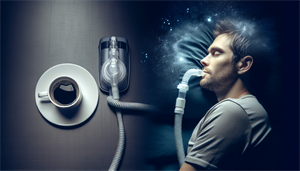
It should be noted that reducing caffeine is just one facet of managing sleep apnea. The most effective primary sleep apnea treatment, in comparison to reducing caffeine intake, is Continuous Positive Airway Pressure (CPAP) therapy.
CPAP therapy provides benefits for individuals with sleep apnea by:
-
maintaining an open airway with a continuous flow of pressurized air
-
preventing airway collapse
-
ensuring uninterrupted breathing
-
decreasing the frequency and severity of apnea episodes.
While reducing caffeine may have a slight impact on symptoms, CPAP therapy has the potential to substantially eliminate apneas and hypopneas. Other alternative non-invasive treatments for sleep apnea, such as:
-
various PAP machines
-
oral appliances
-
behavioral modifications
-
EPAP therapy
For premature infants, interventions based on randomized controlled trials are also more effective than solely reducing caffeine intake for achieving less cognitive impairment.
Caffeine's Role in Cognitive Performance for OSA Sufferers
While caffeine can disrupt sleep patterns, it also has the potential to enhance cognitive performance in individuals with sleep apnea, providing temporary alleviation from the daytime sleepiness commonly linked to OSA. However, contemplating the potential long-term effect on sleep quality is imperative. Although caffeine can offer cognitive benefits, individuals with OSA should bear in mind the possible negative consequences on their sleep quality in the long run, as improper handling of caffeine could exacerbate sleep apnea symptoms.
The correlation between heightened caffeine consumption and enhanced cognitive functioning in individuals with obstructive sleep apnea (OSA) bolsters the notion of caffeine conferring cognitive benefits to those affected by the condition. However, the potential benefits should be carefully weighed against the potential risks, underscoring the complexities in the interaction between caffeine and sleep apnea.
Navigating Daytime Alertness Without Overindulging in Caffeine
Certainly, caffeine can boost alertness and minimize drowsiness, thereby aiding in enhancing daytime attentiveness. Yet, caffeine use could negatively affect sleep apnea symptoms, potentially starting a cycle of reliance where increased daytime sleepiness results in greater caffeine dependence, consequently aggravating sleep apnea symptoms and overall sleep quality.
To enhance daytime alertness without relying on caffeine, sleep apnea patients can consider:
-
Engaging in exercise
-
Ensuring adequate sleep
-
Maintaining a consistent routine
-
Staying hydrated
-
Consuming a balanced diet
-
Taking breaks from screens
-
Practicing aromatherapy
-
Engaging in brief yoga or stretching routines
It is suggested that they refrain from consuming caffeine at least 8 hours before bedtime to avoid potential effects on sleep quality and to sustain alertness during the day.
The Complex Interplay of Metabolic Syndrome, OSA, and Caffeine
The intricate relationship between metabolic syndrome, obstructive sleep apnea (OSA), and caffeine intake is challenging to decode. OSA patients display significantly higher body mass index, glycemia, total cholesterol, LDL, and TG, along with lower HDL, compared to control subjects, suggesting metabolic imbalance. Increased caffeine use has been associated with improved cognitive function in individuals with OSA, reinforcing the idea that caffeine could offer cognitive benefits to those suffering from this condition.
However, the interaction between sleep disruptions, caffeine intake, and metabolic processes is intricate and requires more in-depth research for a comprehensive understanding. This highlights the need for a holistic approach to managing sleep apnea that takes into account the complex interplay of various factors.
Coffee Intake and Its Association with Sleep Apnea Severity
The connection between coffee consumption and the severity of sleep apnea has been scrutinized in numerous studies with diverse outcomes. Some research implies a possible link between caffeine use and increased OSA severity, while others indicate no effect, or even a potential enhancement in cognitive function for OSA patients who consume caffeine.
Another study indicated that patients with obstructive sleep apnea (OSA) exhibit a notably higher coffee consumption compared to control subjects. However, there was no statistically significant correlation identified between caffeine intake and the severity of OSA, daytime sleepiness, or gender. These conflicting findings highlight the complexities in the interaction between coffee intake and sleep apnea severity, suggesting that more research is needed in this area.
Summary
While caffeine can provide temporary relief from daytime sleepiness, it can also exacerbate sleep apnea symptoms and contribute to poor sleep quality. Understanding the complex dynamics between sleep apnea and caffeine consumption is crucial for managing this condition effectively. Reducing caffeine intake, choosing less disruptive caffeinated drinks, consulting a sleep specialist, and considering other treatments such as CPAP therapy can lead to significant improvements in sleep quality and daytime alertness. However, the interplay between metabolic syndrome, OSA, and caffeine consumption is complex and requires a comprehensive approach for effective management.
Frequently Asked Questions
Does quitting caffeine help sleep apnea?
Quitting caffeine, especially after noon, can help improve sleep apnea by allowing you to fall asleep faster and stay asleep longer. This can lead to better quality sleep, which is crucial for managing sleep apnea.
How does caffeine reduce apnea?
Caffeine reduces apnea by increasing central normoxic respiratory drive and enhancing ventilatory long-term facilitation, as well as by enhancing peripheral chemoreceptor activity. It may also have an anti-inflammatory action in the immature lung.
What worsens sleep apnea?
Sleeping on your back can worsen sleep apnea as it causes the tongue and soft palate to fall back into the throat and increase breathing difficulties. Sleeping on your side may help reduce episodes of apnea.
What drinks help sleep apnea?
Drinking caffeine beverages may have positive effects on sleep apnea patients by improving cognitive function, according to some studies. Additionally, consuming caffeine-free herbal tea before bed can have soothing and calming effects, becoming a pleasurable part of your sleep routine.
What is the most effective treatment for sleep apnea?
The most effective treatment for sleep apnea is Continuous Positive Airway Pressure (CPAP) therapy. It is considered the primary treatment for this condition.
